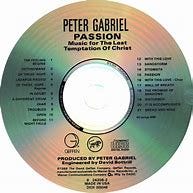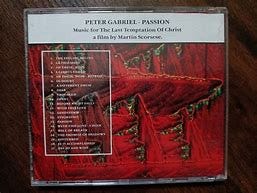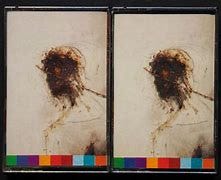This is my fourth and final post about the music and genius of Peter Gabriel. — Mike
I’ve never seen the movie, but I’ve listened to Peter Gabriel’s 1989 “soundtrack” for The Last Temptation of Christ some 200 times, and a few of the songs hundreds of times. Since Gabriel developed the music for a full year after the film was released, the album / C.D. is not really a soundtrack but stands alone as a cultural work.
The C.D. as a whole marks Peter Gabriel as an emissary from some profound psychospiritual realm traversed by very few musicians or other artists. The album’s 21 songs fill our embodied souls with something transcendent. This is a music of meaning; these are sounds from a spiritual oasis with its own sacred frequencies. The album contains mystery and a sense of Divine Presence and is considered by many of us Gabriel aficionados as not only a masterpiece but as one of the best musical compositions of all time.
“The Feeling Begins” starts drawing us in, even sending us into head-spinning motion — into some spine-tingling and soul-stirring territory. After the odd transition of “Gethsemane”, we are enveloped in the rising spiritual energy of “Of These, Hope”. We feel our consciousness expand and flow into something powerful, profound, and fierce.
Few sacred songs quite hit our souls with the depth of “Lazarus Raised”. Our spiritual awareness continues to expand.
“Of These, Hope — The Reprise” gives us that rising spiritual energy again, this time with more haunting beauty and with voices seeming to rise from our species’ origins in Africa. “In Doubt” triggers our sense of something ominous circling about us — and rising spiritual difficulties.
Then there is “A Different Drum”. One of my two favorite songs on the album. There is no other song like it. We gather around a campfire with our ancestors — those hominid and early homo sapiens ancestors. We are stirred by the same spiritual energy that lifted them up beyond the primates to something new in the development of life on Earth. Up from the savannah, we find our voice and our strength, just as our first hunter-gatherer ancestors did. Something deeply primal and deeply spiritual wells up within us, and our whole being — perhaps as we dance around the campfire ourselves — resounds with the extraordinary journey of human consciousness.
With its hypnotic rhythms, “Zaar” opens up our soul even more. “Troubled” takes us into our struggle with our Shadow and our soul’s battle with our mortal nature.
With Gabriel’s ethereal and magnificent “Open”, we feel something within us being freed, being liberated, from our primate nature. We find ourselves standing in a new spiritual place.
“Before Night Falls” is haunting. Then comes “With This Love” — one of the most poignant songs ever written. We sense the sadness of the angels as they witness our suffering. We sense the beauty of the human soul even through the most difficult human experiences.
In “Sandstorm”, we feel the rising strength of our soul as we stand up to the forces mounting against us. In “Stigmata”, we absorb the blows of trauma — and pain that is bodily, primal, and cosmic.
This is followed by Gabriel’s 7-minute-38-second “Passion”. What to say? We endure the ultimate agony. We endure primal human suffering and we hear the primal screams. We experience our ego death. We experience the mystery and beauty of sacrificial love. If we are Christians, we suffer and die with Christ. And then we hear the tortuous ending to His Earthly life answered by a feminine lamentation. His mother’s pain? The sorrow of female angels? The whole song, with its hypnotic intensity, makes real His Divine Presence even as it sends shivers down our spine.
“With This Love” with the choir evokes Heaven and the angels again, this time with the highest celestial love. We may think of the healing of Christ’s body and a preparation for the spiritual healing of humanity.
With “Wall of Breath” we may visualize the Creator breathing new life into Christ’s Being. In “The Promise of Shadows” we might think of His disciples in their lost state. And with “Disturbed” we will perhaps sense some Divine Force moving across the land and Christ’s Soul preparing to walk the Earth again.
“It is Accomplished” is a singular achievement in music. I’ve played this song hundreds of times since 1989, and always I experience the same radiant, pulsing, exhilarating, transcendent, sublime, and triumphant joy. After enduring the struggles and suffering, Gabriel is telling us, the human spirit triumphs over all adverse circumstances and events. If we are Christians, this is the song of Easter — or the period from the first Easter to the first Pentecost — when hundreds of Christ’s disciples experienced Him so vividly that they founded a faith lived out over these 2,000 years by billions of human souls.
Lastly, there is “Bread and Wine”. It’s a fitting end to Gabriel’s album and it’s an evocative work of art. The Divine Mission has found its culmination and been fulfilled in the Incarnation and Glorification, and in the most peaceful and sweetest way we are invited to participate in its ongoing fulfillment.








